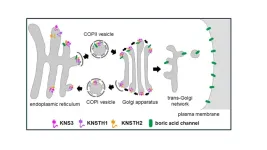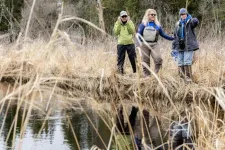(Press-News.org) While pancreatic cancer rates are rising in people under age 50, a new survey conducted by The Ohio State University Comprehensive Cancer Center – Arthur G. James Cancer Hospital and Richard J. Solove Research Institute (OSUCCC – James) shows most people continue to believe that pancreatic disease affects only the elderly – and that there is nothing they can do to reduce their risk.
For this survey, respondents were asked about risk factors for pancreatic cancer. More than half (53%) of adults under age 50 said they would not recognize the early signs or symptoms of the disease, and more than one third (37%) believe there is nothing they can do to change their risk of pancreatic cancer. More than one third (33%) also believe only older adults are at risk.
“Pancreatic cancer rates, however, have been rising by about 1% annually, and we are seeing this disease in people who are in their 40s much more regularly. This is a concerning trend, and one for which research is needed to learned why,” said Zobeida Cruz-Monserrate, PhD, co-leader of the OSUCCC – James Molecular Carcinogenesis and Chemoprevention Program.
Risk factors you can and cannot change
Cruz-Monserrate says reducing risk for pancreatic cancer could start with maintaining a healthy weight. According to the National Institute of Diabetes and Digestive and Kidney Diseases, 1 in 3 Americans is overweight, and more than 2 in 5 are clinically obese. Obesity alone increases a person’s lifetime risk for pancreatic cancer by 20%.
On the flip side, the American Cancer Society (ACS) estimates that just 10% of pancreatic cancers are linked to heredity risk (genetic markers passed down through families), including the BRCA genes, Lynch syndrome and others.
“You can’t change your genes, but you can change your lifestyle. For most people obesity is within someone’s power to change. It also increases a person’s risk for type 2 diabetes, other cancers and cardiovascular disease,” said Cruz-Monserrate.
More than 66,000 Americans will be diagnosed with pancreatic cancer in 2024, with less than 13% reaching five-years of survival, according to ACS estimates.
Other modifiable lifestyle factors believed to reduce your lifetime risk for pancreatic cancer include limiting or eliminating alcohol consumption, regular moderate exercise and a plant-based diet with limited red or processed meat.
More than half of survey respondents (54%) knew that genetic testing helps people understand if they should be screened for pancreatic cancer.
Research for screening, prevention and treatment
OSUCCC – James researchers are conducting studies to identify ways to screen for early signs of pancreatic cancer, including minimally invasive ways of screening pancreatic cysts, and understanding the roles of diabetes and chronic pancreatitis in pancreatic cancer risk. Until science provides more answers, however, Cruz-Monserrate says taking action to change lifestyle factors – especially maintaining a healthy weight – and understanding your family history are key for risk reduction.
“This disease is too often a silent killer, with no symptoms until it has progressed to less treatable stages. We must continue to aggressively pursue research that will help us prevent, diagnose and treat this disease more effectively,” said Cruz-Monserrate, who is conducting research on the prevention of obesity-related pancreatic cancer and on the impact of exercise on the development of this disease and pancreatitis.
To learn more about pancreatic cancer and research at the OSUCCC – James, visit cancer.osu.edu or call 1-800-293-5066.
Survey Methodology
This study was conducted by SSRS on its Opinion Panel Omnibus platform. The SSRS Opinion Panel Omnibus is a national, twice-per-month, probability-based survey. Data collection was conducted from October 4 – October 7, 2024, among a sample of 1,004 respondents. The survey was conducted via web (n=974) and telephone (n=30) and administered in English. The margin of error for total respondents is +/-3.5 percentage points at the 95% confidence level. All SSRS Opinion Panel Omnibus data are weighted to represent the target population of U.S. adults ages 18 or older.
###
END
Survey: Dangerous gap in knowledge about pancreatic cancer among adults under age 50
Most are unaware that obesity increases lifetime pancreatic cancer risk 20%
2024-10-30
ELSE PRESS RELEASES FROM THIS DATE:
Women entering menopause later in life at greater risk for asthma
2024-10-30
CLEVELAND, Ohio (Oct. 30, 2024)—Many studies suggest that an earlier age at menopause is more detrimental to a woman’s health, leading to an increased risk for adverse health conditions such as heart disease, diabetes, osteoporosis, and depression, among others. However, a new study is linking a later age at natural menopause with a greater risk for asthma. Results of the study are published online today in Menopause, the journal of The Menopause Society.
Asthma is a common, chronic disease affecting more than 300 million people worldwide. The prevalence of asthma ...
Sinuses prevented prehistoric croc relatives from deep diving
2024-10-30
EMBARGOED: NOT FOR RELEASE UNTIL 00.05 (UK TIME) WEDNESDAY 30 OCTOBER 2024
An international team of paleobiologists have found that the sinuses of ocean dwelling relatives of modern-day crocodiles prevented them from evolving into deep divers like whales and dolphins.
A new paper published today [30 October] in Royal Society Open Science suggests that thalattosuchians, which lived at the time of the dinosaurs, were stopped from exploring the deep due to their large snout sinuses.
Whales and dolphins (cetaceans) ...
Spirited away: Key protein aids transport within plant cells
2024-10-30
Botanists have come to understand the channels and transporters involved in the uptake and transport of nutrients, yet how are they positioned where they need to be?
For example, plants need boron, which is taken into the cells by molecules known as the boric acid channel. But how do the proteins that form the channel make it to the plasma membrane?
A research group led by Professor Junpei Takano of Osaka Metropolitan University’s Graduate School of Agriculture identified a mutant line of Arabidopsis thaliana in which the boric acid channels are not properly transported to the plasma membrane. The cause was a deficiency in the protein KAONASHI3 (KNS3); the name ...
Britain’s brass bands older than we thought and invented by soldiers from the Napoleonic Wars, new study reveals
2024-10-30
University of Cambridge media release
Britain’s brass bands older than we thought and invented by soldiers from the Napoleonic Wars, new study reveals
UNDER STRICT EMBARGO UNTIL 00:01 AM (UK TIME) ON WEDNESDAY 30TH OCTOBER 2024
Military musicians returning from the Napoleonic wars established Britain’s first brass bands earlier than previously thought, new research reveals. The study undermines the idea that brass bands were a civilian and exclusively northern creation.
It is widely believed that brass bands originated with coal miners and other industrial communities ...
The Lancet: Health threats of climate change reach record-breaking levels, as experts call for trillions of dollars spent on fossil fuels to be redirected towards protecting people’s health, lives and
2024-10-30
The Lancet: Health threats of climate change reach record-breaking levels, as experts call for trillions of dollars spent on fossil fuels to be redirected towards protecting people’s health, lives and livelihoods
New global findings in the 8th annual indicator report of the Lancet Countdown on Health and Climate Change reveal that people in every country face record-breaking threats to health and survival from the rapidly changing climate, with 10 of 15 indicators tracking health threats reaching ...
‘Weekend warrior’ exercise pattern may equal more frequent sessions for lowering cognitive decline risk
2024-10-29
Just one or two sessions of physical activity at the weekend—a pattern of exercise dubbed ‘weekend warrior’---may be just as likely to lower the risk of cognitive decline, which can often precede dementia, as more frequent sessions, concludes research published online in the British Journal of Sports Medicine.
And it may be more convenient and achievable for busy people as well, suggest the researchers.
It’s important to identify potentially modifiable risk factors for dementia because a 5-year delay in onset might halve its prevalence, they say, adding that nearly all the evidence to date comes from studies ...
Physical activity of any intensity linked to lower risk of death after dementia diagnosis
2024-10-29
Physical activity of any intensity after a diagnosis of dementia is associated with around a 30% lower risk of death, finds research published online in the British Journal of Sports Medicine.
The findings prompt the researchers to conclude that those affected should be encouraged to keep up or start an exercise routine, especially as average life expectancy after a diagnosis of dementia may be only around 4-5 years.
Previously published research has linked physical activity with a lower risk of death in people with the disease, but these studies have focused on a single point in time. So it’s not clear if changes in the amount or intensity of physical ...
Brain changes seen in lifetime cannabis users may not be causal
2024-10-29
Lifetime cannabis use is associated with several changes in brain structure and function in later life, suggests an observational study, but these associations may not be causal, finds a genetic analysis of the same data, published in the open access journal BMJ Mental Health.
Some other unidentified factors may explain the differences found, say the researchers, who nevertheless emphasise that further research is needed to fully understand the effects of heavy use and cannabis potency on the brain.
Cannabis use has increased worldwide following its ...
For the love of suckers: Volunteers contribute to research on key freshwater fishes
2024-10-29
A new paper published today, led by Chicago’s Shedd Aquarium, reveals how volunteers across Illinois, Wisconsin and Michigan enabled researchers to gather seven years of data on the spawning migrations of suckers, an understudied yet essential group of freshwater fishes. Using observations collected by trained members of the public, the collaborative team of researchers have discovered that temperature is the primary trigger for sucker spawning migration, which can help inform conservation strategies in light of a changing climate.
“We believe that conservation of native, non-game fishes ...
Bill and Mary Anne Dingus commit $1M to fund Human Impacts on the Earth Fund at Rice
2024-10-29
Bill Dingus ’81, a Rice University alumnus, and his wife Mary Anne have pledged $1 million to support the university’s Human Impacts on the Earth Fund, dedicated to mitigating and addressing the negative environmental effects caused by human activities on the planet. Additionally, the Dingus family is matching other donors’ contributions to the fund up to $250,000.
The Dingus’ donation enables the launch of the Earth and Planetary Opportunities in Research (EXPLORE) program, a new initiative offered through the Department of Earth, Environmental and Planetary Sciences (EEPS) that allows undergraduates of any major hands-on experience in research projects ...
LAST 30 PRESS RELEASES:
Antarctica sits above Earth’s strongest “gravity hole.” Now we know how it got that way
Haircare products made with botanicals protects strands, adds shine
Enhanced pulmonary nodule detection and classification using artificial intelligence on LIDC-IDRI data
Using NBA, study finds that pay differences among top performers can erode cooperation
Korea University, Stanford University, and IESGA launch Water Sustainability Index to combat ESG greenwashing
Molecular glue discovery: large scale instead of lucky strike
Insulin resistance predictor highlights cancer connection
Explaining next-generation solar cells
Slippery ions create a smoother path to blue energy
Magnetic resonance imaging opens the door to better treatments for underdiagnosed atypical Parkinsonisms
National poll finds gaps in community preparedness for teen cardiac emergencies
One strategy to block both drug-resistant bacteria and influenza: new broad-spectrum infection prevention approach validated
Survey: 3 in 4 skip physical therapy homework, stunting progress
College students who spend hours on social media are more likely to be lonely – national US study
Evidence behind intermittent fasting for weight loss fails to match hype
How AI tools like DeepSeek are transforming emotional and mental health care of Chinese youth
Study finds link between sugary drinks and anxiety in young people
Scientists show how to predict world’s deadly scorpion hotspots
ASU researchers to lead AAAS panel on water insecurity in the United States
ASU professor Anne Stone to present at AAAS Conference in Phoenix on ancient origins of modern disease
Proposals for exploring viruses and skin as the next experimental quantum frontiers share US$30,000 science award
ASU researchers showcase scalable tech solutions for older adults living alone with cognitive decline at AAAS 2026
Scientists identify smooth regional trends in fruit fly survival strategies
Antipathy toward snakes? Your parents likely talked you into that at an early age
Sylvester Cancer Tip Sheet for Feb. 2026
Online exposure to medical misinformation concentrated among older adults
Telehealth improves access to genetic services for adult survivors of childhood cancers
Outdated mortality benchmarks risk missing early signs of famine and delay recognizing mass starvation
Newly discovered bacterium converts carbon dioxide into chemicals using electricity
Flipping and reversing mini-proteins could improve disease treatment
[Press-News.org] Survey: Dangerous gap in knowledge about pancreatic cancer among adults under age 50Most are unaware that obesity increases lifetime pancreatic cancer risk 20%



